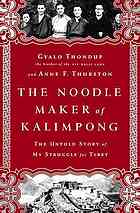
The Noodle Maker of Kalimpong
The Untold Story of My Struggle for Tibet
کتاب های مرتبط
- اطلاعات
- نقد و بررسی
- دیدگاه کاربران
نقد و بررسی

June 29, 2015
China scholar Thurston (China Bound) assists Thondup, elder brother of the Dalai Lama, in telling the story of his life and his homeland's battle for autonomy. Thondup recalls his family's humble origins in the Amdo region; they were uprooted and traveled to Lhasa when his four-year-old brother was declared a candidate for Dalai Lama. Groomed to become a political advisor, Thondup is sent from tumultuous Tibet to study in China, establishing close ties with Chinese president Chiang Kai-Shek and hoping to return home to institute modernization reforms. The 1949 Communist takeover in China and subsequent invasion of Tibet puts his plans on hold; Thondup returns to an impoverished Lhasa as Chinese troops bomb monasteries and use "colonial, imperialistic tactics to divide and rule." Escaping to India, Thondup works with the CIA to train resistance fighters. A tense situation escalates with riots at Norbulingka Palace and the Dalai Lama flees to India, where the brothers organize a "government in exile." After decades of broken negotiations, Thondup returns to Tibet to take over a noodle factory, ruminating on Tibet's continued status as a colony in a world where so many have been liberated. Thondup is straightforward about his regrets regarding his own actions and remarkably less bitter than one would expect. Thurston challenges some of his memories and assertions in her afterword, though it's unclear why she did so. Though the narrative grows repetitive by the end, this is a vital narrative of Tibetans' ongoing effort for independence, and Thondup's bravery is commendable. Photos.

February 15, 2015
From Thondup, the current Dalai Lama's elder brother, a personal perspective on the history of Tibet since the Chinese occupation.Both proud Tibetan nationalists, Thondup and the Dalai Lama were decidedly separated at birth. The Dalai Lama was destined to "cultivate and practice love, tenderness, compassion and tolerance," while Thondup has been well-versed in the grittiness of international political intrigue: "I do not care whether the people I work with are good or bad, whether I like them or dislike them. I just try to carry out my work." Thondup tells his story to China specialist Thurston, who delivers plenty of her own opinions in the introduction and the afterword. Thondup doesn't forgo family history-there is excellent background on the famed Kumbum Monastery and the Yellow Hat sect of the Gelugpa school of Buddhism-nor his latest incarnation: "I am known here as the noodle maker of Kalimpong." But in between, the author chronicles a life of vibrant activity, which, depending on one's political persuasion, was heroic or ill-advised, though not self-aggrandizing. What emerges from the tales of his diplomacy and interlocution, shuttling among Tibet, China, Taiwan and India, wherever he was needed; the scheming and plotting with the CIA ("My role with the CIA weighs heavily on my conscience"); and the at-times overwhelming detail, is that Thondup is a progressive Tibetan, a foe of the entrenched elite and a friend of the workingman-though he often found himself in the wrong place, with the wrong people at the wrong time. Additionally, elements of the story are hard to believe, most glaringly that the Dalai Lama had no knowledge of CIA involvement in Tibetan resistance, as well as the claim of foreign-instigation behind the recent riots (both of which Thurston notes). A thorough but not always convincing story of foreign intrigue.

March 15, 2015
This memoir by Thondup, the Dalai Lama's older brother, is also the story of an isolated and unprepared Tibet's annexation by China, long years of armed Tibetan resistance, and the eventual creation and administration of a Tibetan government in exile. It is a story about clandestine dealings with foreign intelligence agencies such as the CIA and behind-the-scenes political intrigue as much as it is about Thondup's personal experience and activities. While the author succinctly describes Tibetan life, social structure, and religious customs, general readers will need to have a basic understanding of modern Chinese history and the Cold War to fully understand the events described. Unlike the Dalai Lama's writings on Tibet and its people, Thondup's account is less concerned with spiritual struggle than with the violence, political missteps, and miscommunications that led to his country's current political situation. VERDICT Coauthor Thurston (director, Grassroots China Initiative, John Hopkins Univ.; A Chinese Odyssey) acknowledges that she does not necessarily agree with several of the conclusions drawn by Thondup and that some of his narrative is contradicted by the writings of his contemporaries. Nevertheless, this memoir adds an important first-person perspective on the history of Tibet from a key political player.--Rebecca Brody, Westfield State Univ., MA
Copyright 2015 Library Journal, LLC Used with permission.

























دیدگاه کاربران